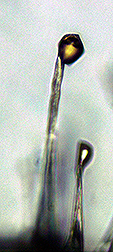This page has been archived and is being provided for reference purposes only. The page is no longer being updated, and therefore, links on the page may be invalid.
Read the magazine story to find out more. |
|
Exploring Sorghum's Knack for Keeping Weeds Away
By Luis PonsMay 9, 2005
Like people, most plants need their space. How much sunlight they get and how large they grow are among the factors directly linked to how much room plants have around them.
And when it comes to protecting its space, few plants are as assertive as sorghum.
That's why Agricultural Research Service scientists who are seeking ways to keep weeds away from food crops have taken a special interest in this drought-tolerant grain. Sorghum has been gaining favor in the United States because of its natural cancer-fighting compounds and digestibility by people with gluten intolerance.
Sorghum is one of many plants with allelopathic traits, according to Stephen Duke, a plant physiologist in the ARS Natural Products Utilization Research Unit at Oxford, Miss.
The roots of allelopathic plants release plant toxins into the soil that hold encroaching plants at bay.
|
Duke and his colleagues – molecular biologists Scott Baerson, Daniel Cook and Ziquiang Pan; plant physiologist Franck Dayan; and chemist Agnes Rimando — agree that sorghum's allelopathic properties are stronger than those of most other plants.
Sorghum's main weapon is sorgoleone (sor-GO-lee-own), a compound that's more active in fighting weeds than most other allelopathic compounds in other plants. Sorghum produces sorgoleone at the root and the root hairs.
Researchers from the ARS unit are developing the basic information needed to genetically increase the production of sorgoleone in sorghum, according to Baerson. They're aided by a cDNA library they developed with help from University of Georgia professor Lee Pratt.
While this overall research may one day lead to introducing allelopathic traits into other crops, care must be taken to ensure that allelochemicals have no negative effects on nontarget organisms, including people, according to Duke.
He says that it's unlikely that allelopathy can totally replace herbicides in weed control. However, any naturally protective traits that could even marginally reduce herbicide use would be financially and environmentally significant.
Read more about this research in the May issue of Agricultural Research magazine.
ARS is the U.S. Department of Agriculture's chief scientific research agency.


